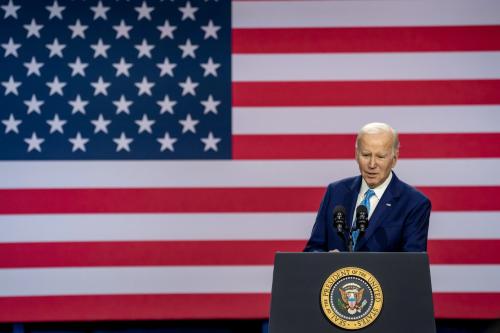As the NATO summit convenes in Vilnius, U.S. public opinion about the alliance and its future activities presents a mixed picture. While strong majorities continue to support NATO and its core responsibilities, Americans are increasingly divided along partisan lines about NATO, support for Ukraine, and America’s role in the world. In an era of divided government, these divisions could affect the level of assistance to Ukraine once the current appropriation expires on September 30, and they could lead to significant changes in U.S. policy if certain Republican candidates get nominated and enter the Oval Office in 2025.
According to a pre-summit survey commissioned by NATO, 52% of Americans feel that NATO contributes to their safety and security, 65% believe that the U.S. should defend another NATO member under attack, and 64% believe that the U.S. should remain a member of NATO, with only 13% opposed. Another survey, this one by the New Europe Center, found that 59% of Americans support inviting Ukraine to become a member of NATO, either now (46%) or when the war ends (13%).
However, there are significant differences of opinions within each major political party. For instance, Pew found that while 62% of Americans have broadly favorable attitudes toward NATO, the partisan divide is wide. Democrats approve of NATO by a 54-point margin (76%-22%), but Republicans are evenly split, with 49% expressing approval and 49% disapproval.
Attitudes toward the war in Ukraine present a similar picture. A Gallup survey conducted in June found that 62% of respondents supported continuing support to Ukraine to regain its lost territory, even if this means a prolonged conflict, versus 36% who favored ending the war as soon as possible. But by a margin of 49% to 47%, Republicans favored ending the conflict quickly, even if Russia keeps the territory it has conquered. By contrast, 79% of Democrats wanted to support Ukraine’s effort to regain its lost territory, with just 19% opposed. A narrower majority of independents (55%-43%) also favored support for Ukraine’s fight to reclaim its territories.
Another Pew Research Center study released on June 15 found a huge and widening partisan divide on the level of aid the U.S. is providing to Ukraine. Overall, 28% of Americans think that the current level of U.S. aid is excessive, compared to 47% who believe that it is about right (31%) or inadequate (16%). But fully 44% of Republicans think that we are providing too much support, compared to just 14% of Democrats. Since the beginning of the war on February 24, 2022, this gap has steadily expanded from 4 percentage points in March 2022 to 30 points this June. In a similar vein, a recent Reuters/Ipsos poll found a near-majority of Republicans (48%) endorsing the proposition that “the problems of Ukraine are none of our business, and we should not interfere.” Consistent with this view, 44% of Republicans opposed military aid to Ukraine and 61% rejected financial aid.
Despite the majority’s pro-Ukraine stance, relatively few Americans are optimistic about the course of the war. According to Gallup, a substantial majority (57%) believe that neither side is winning, versus 12% who say Russia and 30% who say Ukraine. Even among Democrats, only 45% believe Ukraine is winning, versus 48% who answered neither. It remains to be seen whether America’s support for Ukraine will remain robust if the current Ukrainian counteroffensive fails to break the apparent stalemate.
Even more than the future of Ukraine is at stake as the U.S. presidential election heats up. Pew’s findings indicate 60% of Democrats believe that “it is best for the future of our country to be active in world affairs”, compared to 39% who say that “we should pay less attention to problems overseas and concentrate on problems here at home.” Among Republicans, however, fully 71% say that we should concentrate on domestic problems, while only 29% endorse an active international role for the United States. We will find out after the 2024 election whether these differences augur the greatest change in U.S. foreign policy since the Republican Party abandoned its longstanding isolationism after World War II.








Commentary
Democrats and Republicans have different views on NATO and Ukraine
July 11, 2023